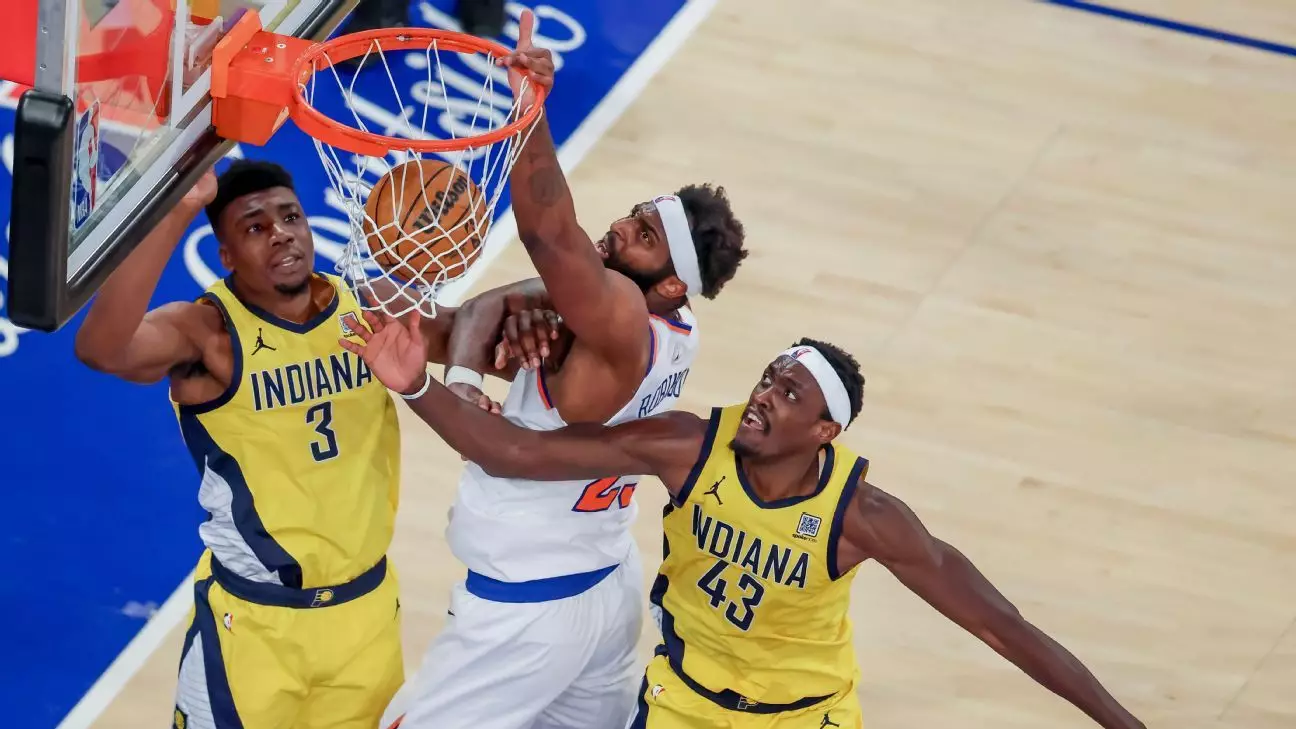The Indiana Pacers faced an unexpected debacle on a crucial playoff night, succumbing to the New York Knicks with a score that echoes the frustrations of every basketball enthusiast: 111-94. Their performance was an exceptional low in what had been a promising postseason journey. Such a lackluster display could have sent tremors of panic through any stable organization; however, the response from star guard Tyrese Haliburton hinted at a deeper attitude permeating the Pacers’ locker room. While Haliburton’s assertion that there was “no need to panic” might be seen as reassuring, one must wonder if it obscures the pressing concerns that loomed large after that night.
The Pacers’ offensive output was not merely poor; it was astonishingly tragic. It was a game where not a single player in the starting lineup could muster more than 15 points—a collective total that felt like a slap in the face to fans hoping to witness basketball prowess. An uncharacteristic 20 turnovers marred their performance, painting a dismal picture of a team floundering under playoff pressure. If ever there were a moment to awaken from the euphoria of prior successes and reevaluate strategies and processes, surely this was it.
A Team in Crisis: Reflection and Realization
It’s compelling to hear Coach Rick Carlisle reflect on his team’s apparent inability to match the energy and aggression exhibited by the Knicks. His comments about starting without the “right level of force” and never holding a lead serve as potent metaphors for the internal struggles that might plague the team moving forward. A philosophy built on resilience can only go so far without actionable change, and the Pacers seem to be grappling with their own identity in these late-season skirmishes.
It’s easy for athletes and coaches to preach about learning from defeats and responding positively. Yet one must question whether they can translate that rhetoric into meaningful action on the hardwood. While Haliburton vowed to elevate both his own game and that of his teammates, the reality of the playoff landscape remains merciless. Haliburton’s disappointing eight-point outing, complete with inadequate shot attempts, exposes a crucial vulnerability—a disconnect between aspiration and execution that must be addressed if the Pacers hope to navigate the treacherous waters of postseason basketball.
A Silver Lining or an Illusion?
Bennedict Mathurin’s radiant presence off the bench and Aaron Nesmith’s candid remarks reveal a flickering ember of hope amidst this ominous cloud. Mathurin’s team-high 23 points suggest that the franchise has formidable pieces to persist in the series. Yet, there’s a fine line between temporary success and sustainable performance. It begs the question: is this resilience merely a façade, a pleasant distraction from deeper issues that, if left unaddressed, could derail their aspirations?
Nesmith’s incisive comment about the necessity of facing defeat as a vehicle for growth poses an interesting paradox. Losses can indeed sharpen a team’s focus and ignite a sense of urgency, yet in the emotionally charged arena of playoff basketball, it’s vital to steer clear of complacency. The Pacers may have the mental fortitude needed to regroup; however, history shows that waiting for strength to emerge from losses can lead to a pitfall if not approached with discipline and critical analysis.
Looking Ahead: Home Court Advantage as a Double-Edged Sword
As the Pacers prepare to face the Knicks again in Game 6 in Indianapolis, the weight of expectation—and pressure—will squarely rest upon their shoulders. Playing at home typically ushers in an environment ripe with support, yet it can also intensify scrutiny and elevate the stakes. The seductive idea of using home court advantage to shake off a disappointing performance can inflate the significance of their upcoming matchup.
Will they rise to the occasion, reflecting the grit that got them here, or will the specter of Game 5 linger like a ghost, haunting their intentions? As Pascal Siakam remarked, such nights are just part of the delicate balance of professional basketball. “You’re going to have bad games,” he wisely observes, yet the overarching question remains: will this team learn from the experience, or will it succumb to the pressure, losing its grasp on the series as it slips away in the shadows of self-doubt? The path to the next game is fraught with danger, and the only certainty is the unfolding drama of the playoffs.



Leave a Reply